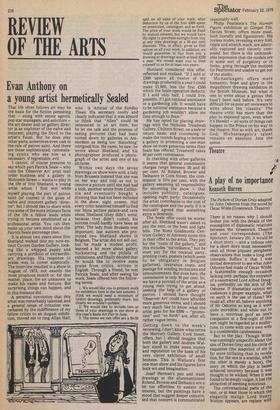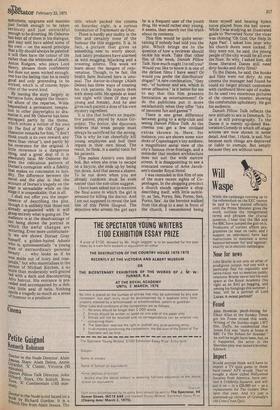Theatre
A play of no importance
Kenneth Hurren
The Picture ofDorian Gray adapted by John Osborne from the novel by Oscar Wilde (Greenwich Theatre) There is no reason why I should bother you with the details of the resumption of diplomatic relations between the Greenwich Theatre and your correspondent (The Spectator, January 25). It would be a short story — and a tedious one, for a short story must necessarily omit all those piquant peripheral observations that make a long one tolerable. Suffice it that I was invited downriver to see what John Osborne had made of Oscar Wilde, a fashionable enough occasion lacking only, perhaps, the entrance of a resurrected Lord Alfred Douglas, preferably on the arm of Mr Osborne. If dramatists cannot set audiences a proper example, what on earth is the use of them? We could all, after all, believe anything of Mr Osborne so long as it were quite incredible; and while not to have a notorious poof as ones companion at a first-night of this sort might be regarded as a misfortune, to come with one's own wife is a considerable carelessness.
But to the play. Though Wilde was cunningly unspecific about the sins of Dorian Gray and his circle of exquisites (the suspicion of sin is far more titillating than its revelation, for the one is a scandal, while the other is merely a bore), the story on which the play is based achieved notoriety because it was thought to be wicked. When it was found to be simply vulgar, it lost the attraction of seeming notorious. The conversational parts of the text, or at least those in which the elegantly malign Lord Henry Wotton appears, are replete Wan
aphorist/is, epigrams and maxims Just foolish enough to be taken seriously and just untruthful enough to be diverting. Mr Osborne has kept all of them in his dialogue, and may well have added some of his own — on the sound principle that a lily should always be painted: it will then have the colour of life rather than the whiteness of death. Anton Rodgers, who plays Lord Henry, phrases them confidently but does not seem wicked enough: one has the feeling that he is really good and only pretending to be wicked, which is, of course, hypocrisy of the worst kind.
By leaving the story largely in narrative form, despite the theatrical allure of the repartee, Wilde bequeathed a permanent temptation to other playwrights to dramatise it, and Mr Osborne has been entrapped partly by the theme, Which echoes a notion of his own (in The End of Me Old Cigar, a Character remarks for him, "I don't think youth is its own reward, any more than virtue''), and partly by his reverence for the original, A little reverence is a dangerous thing, and a great deal of it is absolutely fatal. Mr Osborne follows the ridiculous pattern of Dorian's corruption with a fidelity that makes no concession to lucidity. The difference between the novel and the play is that the account of Dorian's tragedy on the Page is unreadable while on the stage it is unspeakable; that is all.
I shall not offer you the impertinence of describing the plot, though it is unlikely that those not already acquainted with it will grasp entirely what is going on. The audience is at the disadvantage of not being shown the portrait in Which the awful changes are occurring. Even more unfortunateiY we are shown Dorian Gray himself, a golden-haired 'Adonis who is, quintessentially "a young man of extraordinary personal beauty ... who looks as if he W5 made out of ivory and rose Petals," but who materialises in the Person of Michael Kitchen, a no More than moderately well-graced lad with a dark and disconcerting
Afro haircut. His entrance is preceded and accompanied by a deli
cate little peal of bells. Nothing Spoils a tragedy so much as a sense of humour in a producer.



































 Previous page
Previous page